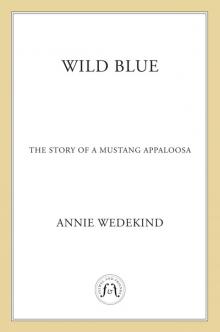- Home
- Annie Wedekind
Wild Blue - The Story of a Mustang Appaloosa Page 2
Wild Blue - The Story of a Mustang Appaloosa Read online
Page 2
Neee! A small, unsteady figure stood in the clearing straight ahead, moonlight picking out the white in her beautiful coat of red roan. Unaware of Blue’s approach, the foal let out another bleat, then hung her head down, struggling to stay up on her quivering legs.
Neigh! Blue’s answering blast was hardly more mature than the foal’s, but the exhausted creature lifted her head eagerly and immediately struggled forward, joyfully bleating with every tremulous step. Blue bounded ahead to meet the foal, and soon the two youngsters were flung upon each other’s necks like schoolgirls, sniffing and nuzzling and greeting each other as the lost half sisters they were.
The look of surprise and wonderment on their father’s face when the two young foals emerged proudly from the woods to rejoin the herd was something that both sisters relished for their entire lives. The lead mare adopted the motherless filly, and ever since that night, the two roans, so similar yet so different, were never more than a few strides apart. The legend of Blue’s boldness and Doe’s endurance gave them a certain status among the other mares, young as they were.
But Doe’s mother was never seen again. Her daughter never forgot her, and neither did Ollokot.
* * *
This was a harsh but beautiful world for wild horses, a territory unlike any other mustang habitat. Hidden in a northern Idaho wilderness, amid forests of Douglas fir and western white pine, cedar and hemlock, a handful of herds had somehow managed to find a small range so forbidding to travelers, so unlikely a place for a horse to live, that they had escaped capture and displacement for decades. They might not thrive here, but the hardy could survive. And the special pleasures of the snowy mountains—the tender grasses of the hidden valleys, the fresh snowmelt, the intoxicating wind—were such that few mustangs had ever enjoyed. They might not have hundreds of miles to roam, or rich, rippling grass plains to graze, but the Appaloosas and the other mustang herds of this unusual refuge had something more important: freedom.
To be sure, their presence had not gone entirely unnoticed over the years. Old logging trails scarred a portion of the surrounding forest, and the horses were accustomed to the occasional human. But whether on foot, horseback, or truck, the two-legged strangers usually kept their distance, and the band stallions, especially the fierce Ollokot, never allowed them close enough for more than a glimpse of their carefully guarded families.
It had been some time since Blue and Doe had seen a human, and now their concern was somewhere else entirely. It was an almost balmy day, the sun strong and warming. The sisters stayed close to the new filly and her mother, licking the foal’s silky, pale coat, breathing encouragement through their delicate, mottled nostrils. The old bay mare was clearly anxious, and Doe gave herself over to grooming her mane and the top of her withers gently with her teeth, a soothing ritual of comfort that the sisters often performed together. While Doe took care of the tired, worried mother, Blue tried to help the youngster move forward. She could stand, but she seemed unwilling to walk more than a few shaky steps.
Fly wasn’t much help, either. In his eagerness to play with his new half sister, he had knocked her over several times, and the sheer effort of returning to her feet exhausted the filly. Finally, Blue snappishly drove Fly away, and let the foal rest. Blue’s gaze followed Fly as he half galloped, half tumbled down the hillside, in search of his friends the bachelor stallions. Blue spotted them before her brother did. They stood almost shyly on a hillcrest, motionless except for the breeze capturing and tossing their long manes and tails. The grullo stood nearest, and he was staring straight at Blue. Suddenly, he trumpeted to her, his bold, strong voice echoing through the hills. An almost irresistible response thrilled through Blue and an answering call rose in her throat … until she saw Ollokot glaring at her a few paces away. Feigning indifference, Blue turned her back to both her suitor and her father and lowered her head to graze.
Blue knew she was too young to leave her family herd, and she suspected that the grullo was too young to challenge her father, but she was curious about the bold stallion, so like her in color except that instead of the white swirls that marked Blue’s coat, especially toward her head, where she became less roan and more absolutely spotted, he sported a dark line down his blue-gray back and faint dark stripes, like black lightning, down his legs. Someday, perhaps, they would meet and touch muzzles, trade each other’s scent, and she would take the full measure of this wild horse, the first outside her herd to interest her.
This partial communication did not go unobserved by her sister, who now interrupted her grooming of the old mare to swing closer to Blue. Doe lay her head across her sister’s back, her richly speckled neck and dainty freckled face almost pink in the evening light, a delicate contrast with the stormy gray coat on which she rested her chin. Don’t go. And as Blue lifted her head from grazing, she nuzzled her sister’s side in reply. No, not yet.
* * *
Them’s two pretty ones, the ones standin’ together. The man in the battered cowboy hat rolled down the window of the truck to spit.
Scrawny runts. Ain’t a real horse among ’em. They’s all mutts, his companion grunted from the driver’s seat. Where’d you hear about ’em? Ain’t supposed to be no wild horses up here.
Fella at the gas station. Real proud of ’em, he was. Like they had this big secret up here that nobody knew about. I still say those two young’uns are nice lookin’. Folks’ll pay for colors like that.
The driver looked skeptical, wrinkling his nose as he drew his binoculars away from his pale blue eyes. You think they’re BLM horses?
Naw, the Bureau don’t even know about ’em. I told you, that’s what the fella said.
Hard to believe in the twenty-first century there are cayuse runnin’ wild and don’t nobody know about it, ’cept some local animal nutsos.
I’m tellin’ you, that’s what the man said. I was askin’ about huntin’ in the Wilderness, and he tole me to watch out we didn’t run into the mustangs. Said this herd wasn’t protected by the Bureau of Land Management like most other wild horses are. So if the BLM ain’t protectin’ ’em, they won’t miss a few neither.
So whaddya wanna do? Have a roundup? How’re we gonna do that with just us and this old truck? We can’t drive over those mountains.
I got an idea ’bout that, but it’s gonna have to wait till we get back to town. I can’t have much of a discussion on an empty stomach.
The blue-eyed man grunted again and turned the key, startling the old Chevy to life. In the distance, Blue and Doe heard the sound and threw their heads up simultaneously, nostrils flared. But it soon faded away, and they returned to grazing, feeling that the danger was gone.
CHAPTER 3
Each week brought new scents, new life, new sensations to the mountain valley. Now the hillsides were abloom with frothy lilacs that perfumed the air with the smell of orange blossoms, and grouse feasted on the flowers of honeysuckle vines that ran riot under the trees. Blue’s herd wandered the breadth of their territory, shared with deer and the occasional family of bears and visited regularly by the band of bachelors, who still bowed to Ollokot’s authority and kept their distance.
The mares and fillies were worried about Shadow, the new foal. While Fly was already imitating his elders and attempting to graze—though he could barely reach past his long legs to fumble at the grass with his milk teeth—Shadow didn’t seem to get much nourishment from nursing, and tired easily. She struggled gamely to keep up with the herd as it made the circuit from grazing ground to watering hole, and the lead mare kept the pace slow. Indeed, everyone treated the pale little filly tenderly, even her boisterous half brother, who often suspended his play to settle down next to Shadow for a nap, flank to flank, in the warm June sun. While they slept, Blue stood nearby, on watch.
She’d shed the last of her winter shag some time before, and the brilliant spring sunshine burnished her coat till it shone like rocks at the bottom of a clear mountain stream—at least in the places where it wasn�
�t caked with the mud in which she and Doe played after rainstorms. Her thick, tangled mane and brushy forelock were almost as black as her father’s, and now, in her second year, her head, with its Roman nose, large, intelligent eyes, and pink muzzle, could have been a smaller copy of Ollokot’s. Blue was not “pretty”—not in the way Doe was—but she had an unusual beauty of her own: a beauty shared by the wild outreaches of her landscape, by rock and rain and wind, summer lightning storm and black thunderhead.
Tenderhearted Doe was especially concerned about Shadow, and she was the most help to Shadow’s mother in encouraging the foal to try to build her strength, and to keep up with the herd. Doe and Blue’s help allowed their father and the lead mare to focus on guiding and protecting the entire herd of ten, from moving to new grazing ground to spotting cougars lurking in the rocky hills. It thrilled Blue to watch her father drive off a big cat, for, once spied, the cougar had no chance against Ollokot’s slicing hooves and ferocious charge. Losing the element of surprise, the cougar slunk away. And so far Ollokot had never let a predator sneak up on his band unseen.
* * *
Summer rains broke suddenly over the grooved slopes of the hills, carved out from thousands of years of storms and snowfall. The highest peaks seemed to attract the black thunderheads, which released their weight in sudden, furious bursts that often ended just as quickly as they began, leaving the sky washed and brilliantly blue. But sometimes the rainstorm built gradually over the course of a dark, sullen day, heavy with clouds. On these days, lightning flickered over the hills like cold wildfire.
Neither Shadow nor Fly liked this kind of weather; indeed, a slow-building storm could set the entire herd on edge. On one such gloomy morning, Blue awoke from a light doze, the smell of electricity in her nostrils. A breeze was moving down the mountain toward the edge of the forest, where the herd had gathered in anticipation of wet weather, and it blew her mane back in ripples across her withers. She stamped a hoof, breathing deeply, nostrils flared, to see what was on the wind. She felt uneasy, with an almost foal-like nervousness about the coming storm. Is it the storm, she wondered, or is there something else on the wind?
Doe stood quietly by her sister’s side, head lifted to the breeze. She watched as Shadow, lying almost between her mother’s hooves, raised her head and began the slow process of untangling her spindly legs and climbing to her feet. Somewhat apart from the herd stood the lead mare and Ollokot, also gauging the weather and preparing for the morning trip to the water hole, some distance away. An eerie calm seemed to suspend the forest, the band of mustangs, the morning itself in a hushed state broken only by the raucous shrill of a pair of crows, who didn’t mind rain in the slightest. Shadow, spooked by the nervous energy in the air and by the occasional crack of distant thunder, followed her mother with unusual energy toward the trail.
There was no sound—no snap or crack or clang—when Shadow collapsed. It seemed as though the little foal had simply tripped, as she often did, and her mother nudged her impatiently—Get up now, we’re going to water and don’t want to be left behind. Blue noticed that Shadow was pitched forward awkwardly on her knees, her muzzle touching the ground, one leg splayed behind at an unnatural angle, and she trotted over to investigate, followed by Doe. The sisters covered the filly with warm, encouraging breaths, and her mother nickered anxiously—the lead mare had struck out on the trail, and the herd was on the move.
Shadow struggled to pull her forelegs out from under herself. She was as eager to get going as the rest of the band. With her mother and Blue and Doe whickering over her, ready to help, she gave a great heave and pushed herself up and onto her feet, but a bleat of pain and confusion wrenched from her throat as she rose. Her right hind leg stuck out behind her with only the tip of the hoof touching the ground. Shadow looked backward at it, giving another high whinny. Her leg was trapped.
The snare bit a snakelike circle around her cannon, just above the hock. The wire was attached to one of the large, heavy rocks that were such a familiar part of the terrain. And though the mustangs couldn’t see it, this rock was wedged between two even larger boulders. Shadow was going nowhere.
Confused, her mother nudged Shadow again, desperate to catch up to the safety of the herd. Shadow gave a gallant push forward and collapsed again onto her knees. Blue was perplexed: Obviously the young filly was hurt, but how? She saw the wire around her leg, and how it stretched back to the nearby rocks, but she couldn’t make sense of it. Having only rarely seen any man-made object, the trio of mustangs had no way of understanding it or helping Shadow to fight it.
Shadow understood it. Shadow could feel it. It was a trap. It was binding her. And with the instinct of a thousand years coursing through her veins, tiny Shadow called up all her strength and all her courage and she rebelled. Again and again she threw her body away from the fixed point of the rock, straining forward on three legs until she fell with a cry of pain as the snare bit into her reed-like leg and blood sparkled up around the hateful wire.
The battle was awful to watch, and Shadow’s mother trumpeted in panic to the rest of the herd: Help! Help! Help! There was wild fear in every note of her cry. Moments later, Ollokot came thundering back along the trail, mane and tail streaming behind him as the storm clouds broke and the rain came down upon his black-and-white back and the patterned backs of the small group of horses encircling the exhausted, shivering filly.
There was nothing Shadow’s father could do. There was nothing any of the herd could do. For hours they stood under the driving rain, watching the foal fight and collapse, fight and collapse, fight and collapse, until her strength gave out and she moved no more, except for the labored breaths that trembled her sides and sent puffs of smoke from her muddied nostrils. She—and the rest of the herd—were caught on a fairly steep slope, and as the rain came down, the ground turned to a slippery sludge. Despite all the water, there was nothing to drink. And the lead mare and Ollokot knew that they had to take their family to water soon.
Blue watched her father pace a restless, frustrated circle around the band, forelock dripping rain into his white-rimmed eyes that flickered from his trapped daughter to the hills beyond, the lightning, the storm clouds. Blue shook her head, trying to no avail to rid herself of the damp. She felt stiff from her hours of fruitless vigil over Shadow. As the foal rested, she and Doe used their bodies to try to protect her from the worst of the rain and the mud shifting down the hillside. Shadow’s mother was almost as exhausted as her daughter. She was an old mare, and the strain and lack of water were taking their toll.
Night fell. The band huddled closer together. And the rain came down.
* * *
There seemed to be no real dawn in the gray world that greeted the bedraggled herd that morning. The sky paled—that was all. The rain at least had paused as the storm clouds moved rapidly over the crest of the hills to the north. Blue broke from her position by her two half sisters to stretch her legs and to find her father. As she moved over the churned-up mud and slick grass, her wet coat looked patterned after the spring storm itself; it was as if she’d sprung from a marriage of the rocks and rain and wind. From the energy in her compact, leanly muscled body to the wild swoop and tangle of her dark mane and tail to the rough contours of her head and crested neck: She looked every inch a daughter of the wilderness. She didn’t enjoy the rain, not like the crows who were bounding jauntily from their nighttime forest perches to feast on the grubs flushed out by the water. But storms suited her somehow, were part of her nature. She was cold and wet and sore—and felt just fine.
As she and her father touched noses, she could sense his worry: The herd would have to water soon, and if Shadow couldn’t rise, she would be left behind. For several moments, father and daughter held a silent communion, then Blue abruptly swung away and trotted back to the still-sleeping Shadow and resumed her post. She lifted her head to Ollokot. Go. I’ll keep watch. When you return, I’ll go to drink.
The lead mare came to inspect
Shadow. She gently nudged the filly, and Shadow raised her head. The lead mare nudged harder, and Shadow shifted upright. Bracing her forelegs, she tried to rise. After a brief struggle, she sank down with a groan. The lead mare raised her head and touched muzzles with her daughter and Doe before moving to the head of the herd, setting off on the trail to the water hole. Blue watched as, one by one, the dispirited, thirsty mustangs followed in her wake. Only Shadow’s mother, Doe, and Blue stayed by the fallen foal, until Ollokot swung around and snaked his head at Shadow’s mother, teeth bared, ears pinned flat to his head. She might be willing to die by her daughter, frail as she was, but Ollokot wasn’t going to let her. His two-year-old daughters were strong. They could last some time more without a drink, especially with the wet grass to nibble on. Determined to move the rest of his family quickly, the band stallion barely cast a backward glance at the trio who remained behind. He would return for them.
An hour passed, and the rain started again. Doe and Blue grazed what they could from the mud-stained slopes, then returned to their posts over the foal, whose half-closed eyes and shallow breathing spoke her distress. The rain fell harder, and at a sudden crack of thunder, Doe spooked and half bolted toward the trees. Blue began to feel on edge as well. The storm’s noise was jarring—the wind picked up and a confusion of wet and wind and thunder roll swept over the trio’s lonely hillside. Amid the noise and the rain and the shifting winds, the sisters didn’t catch the new scent coming from the old logging trail, farther in the trees. And they didn’t hear the grumble of an old Chevy as it idled forward so its passengers could get a closer look at the rain-soaked band of sisters.
But when another crack of thunder shook the ground beneath them and Doe spooked again, bounding toward the water trail in an almost unbearable instinctual urge to join her herd, she could not miss the sudden, vicious bite of metal around her fetlock. Lunging forward, away from the pain, Doe felt as if her leg were stuck in a mud hole—something was dragging at her, slowing her down. She wheeled around and saw the wire connecting her to the stone, but didn’t understand it; all she understood was that she couldn’t move as usual, and she cried out to her sisters.

 Wild Blue - The Story of a Mustang Appaloosa
Wild Blue - The Story of a Mustang Appaloosa Little Prince - The Story of a Shetland Pony
Little Prince - The Story of a Shetland Pony Samirah's Ride
Samirah's Ride A Horse of Her Own
A Horse of Her Own Mercury's Flight - The Story of a Lipizzaner Stallion
Mercury's Flight - The Story of a Lipizzaner Stallion